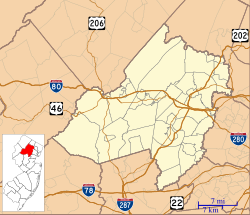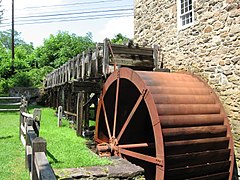|
Nathan Cooper Gristmill
The Nathan Cooper Gristmill is a historic gristmill on the Black River located at 66 NJ Route 24 in Chester Township, Morris County, New Jersey.[3] It was added to the National Register of Historic Places on November 21, 1976 for its significance in industry.[4] Since 1973, the Morris County Park Commission has owned and operated the mill and its 14 surrounding acres as a historic site.[3] History18th centuryCirca the 1760s, county judge Isaiah Younglove[5] constructed a no-longer-extant mill on the Black River.[6] Younglove's mill began flour milling production on the site. Images of America: Chester claims Younglove's mill burned down in an unspecified year,[5] while the Morris County Park Commission describes his endeavor as having shut down in 1788.[3] The mill then went through several owners before 1825. The last owner prior to the Coopers was Elias Howell.[7] 19th century heydayIn 1825, retired general Nathan Cooper (1751–1834) purchased the 4.5 acres of land for $750.[3][8] This included "a milldam, sawmill, an old gristmill, and [a wooden] water wheel."[9] This was an addition to his wealth, as he too had the ownership of over 1600 acres of land[10] including multiple mines under Cooper, Hewitt, & Co.[11] The following year, Cooper rebuilt the mill, constructing a four-story random fieldstone gristmill to replace the 1760s structure.[3][9][12] The new building employed the use of "four sets of millstones connected by elevators to grain cleaners and flour sifters." These incorporated the designs of American inventor Oliver Evans.[13] The mill could grind up to 10 tons per day of wheat, corn, and other grains.[3] Also in 1826, Nathan Cooper gave the property to his adult nephew, Nathan A. Cooper, who had become a NJ cavalry general 2 years before.[9] In 1827 and 1829, Nathan Cooper "raised the height of the dam as it stood."[8] Nathan A. Cooper commissioned a house to be constructed nearby for his son, Abram W. Cooper (1848–1933) as a wedding present.[14][9] In the 1870s, the Coopers installed modern turbines to replace the original wooden waterwheels.[3] Upon Nathan A. Cooper's 1879 death, Abram W. Cooper (one of his nine children) inherited ownership of the mill.[9] Abram W. Cooper was described contemporaneously as a man whose "life had been quiet and uneventful, but upright and honorable...devoted to his business interests and the requirements of citizenship."[15] Later, Nathan A. Cooper (1802–1879) inherited this mill when his uncle Nathan died.[16] In the 1880s, Milltown experienced bustling economic success, and the Cooper mill "played a key role in the community and the region's industrial development." The mill shared Main Street with "a blacksmith shop, a general store, a tavern...and the Mountain Spring Distillery, a cider mill." The Coopers used their growing wealth to build family mansions in nearby Chester.[17] The mill continued to grind grain into flour until 1913.[9] 20th centuryOn January 31, 1913, the Milltown general store across the street burned down in a fire. The same year, the mill ceased to operate.[9] In an unknown year, the Old Mill Tavern pub was built atop the site of the Milltown general store.[5] Museum conversionIn 1973, the Morris County Park Commission acquired the mill.[3] After the acquisition, the mill was restored[12] and Abram Cooper's home was converted into a Visitors' Center.[9] The site opened to the public in October 1978.[3] Visitors of the mill museum take home "stone-ground flour and cornmeal produced at the Gristmill."[3] After its acquisition in 1973, the Morris County Park Commission converted the Abram Cooper home into a Visitors' Center.[9] The mill has since been kept in operating condition, being preserved as it was in the 1880s "with some updates" including the addition of electricity and a new water wheel.[6] Its current wheel is an "all-steel-Fitz Company waterwheel"[3] from 1927.[6] During Hurricane Irene in 2011, multiple local rivers flooded including the Black River. However, the mill was left undamaged due to its strategic elevated placement to avoid flooding, a feature of most historic mills.[6] In 2010, it was New Jersey's only restored water-powered mill.[18] This claim was falsified by the 2020 restoration of the Red Mill in Clinton, New Jersey.[19] The Friends of Fosterfields and Cooper Gristmill, a non-profit organization, contributes money and expertise to run the mill.[20] It is open April through October and offers several educational programs and summer camps.[6] Gallery
See also
References
External linksWikimedia Commons has media related to Nathan Cooper Gristmill.
|
||||||||||||||||||||||||||||||








